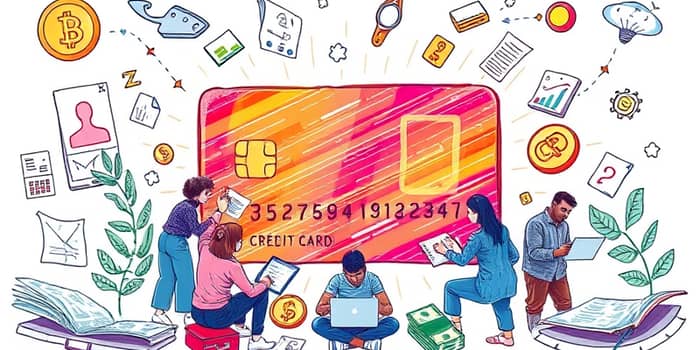Freelancing offers incredible freedom, but it can come with irregular income and complex expenses. Choosing the right credit card can transform a disjointed financial experience into a streamlined system that not only simplifies bookkeeping but also unlocks substantial savings and rewards. In this comprehensive guide, we’ll explore the best credit cards for freelancers in 2025, outline key benefits, and provide actionable strategies to optimize every dollar spent.
Whether you’re just starting your freelance journey or you’re an established professional seeking higher-tier perks, you’ll discover options tailored to your unique spending patterns and business needs. Let’s dive in.
Top Credit Cards for Freelancers in 2025
Here are the leading options based on overall value, simplicity, and specialized features. These cards dominate due to their robust rewards, cost efficiency, and valuable introductory offers.
This table highlights the core features that matter most to freelancers: fees, rewards, and introductory financing. Use it as a starting point before drilling down into niche profiles and specialized needs.
Matching Cards to Freelancer Profiles
Every freelancer has individual priorities. Here’s how to align your choice with your professional profile and spending habits.
- Established Professionals with High Spending: The American Express Business Gold Card shines for those spending big on advertising, travel, or client entertainment. Its dynamic rewards adjust to your highest categories, offering maximum returns on critical expenses.
- Category Flexibility Seekers: Bank of America Business Advantage Customized Cash Rewards provides 3% back in a category of your choice and 2% on dining. With no annual fee and a $300 statement credit, it balances flexibility with simplicity.
- Growing Businesses: Capital One Spark Cash Select gives 1.5% cash back on all purchases and a solid welcome bonus, making it ideal if you anticipate scaling rapidly but want straightforward rewards.
- Service-Based Providers: U.S. Bank Triple Cash Rewards Visa® Business offers 1.5% cash back on everything and 2% on common business expenses like utilities, perfect for agencies and consultancies with high recurring costs.
- Tech-Savvy Entrepreneurs: Ramp Card focuses on automation, real-time expense tracking, and advanced analytics—an essential tool for freelancers in software development and digital marketing.
Key Financial Management Advantages
Separating personal and business finances is more than a best practice; it’s a lifeline for efficient accounting and stress-free tax preparation. Dedicated business cards offer:
- Streamlined expense tracking and tax preparation through integrated software upgrades.
- Automatic reports that categorize transactions, saving hours each month.
- Primary auto rental insurance for business trips, eliminating secondary coverage worries.
- Purchase protection and extended warranty on essential equipment and software purchases.
Tax Advantages of Business Credit Cards
One of the most overlooked perks of business credit cards is the tax benefits they unlock. When you use a card exclusively for business expenses, you can:
- Write off business credit card interest on Schedule C (Line 16), reducing your taxable income.
- Deduct 100% of the card’s interest payments if used solely for business purposes.
- Leverage expense-tracking services that scan past transactions for missed write-offs.
These deductions can add up, especially if you carry a balance occasionally due to the 0% intro APR periods many cards offer.
Reward Optimization Strategies
Maximizing rewards involves more than picking a high headline rate. Employ these tactics to elevate your earning potential:
- Match card rewards to your highest spending categories—office supplies, travel, or software subscriptions.
- Stagger welcome bonuses by timing applications to meet spending thresholds without overspending.
- Rotate or switch bonus categories annually to capitalize on changing business needs.
- Combine flat-rate and category-specific cards for a blended approach that covers all expense types.
Considerations When Choosing Your Next Card
Before applying, evaluate these critical factors to ensure the card aligns with your unique situation:
1. Spending Volume: If you’re just starting, a no-fee card with flat-rate rewards often yields the best net value. For established freelancers with significant outlays, the benefits of premium cards can far outweigh their annual fees.
2. Fee Structure: Weigh annual fees against the value of perks such as travel credits, free employee cards, and enhanced insurance benefits.
3. Interest Rates and Credit Terms: A 0% intro APR period can be a lifesaver when clients pay slowly, but ensure you have a plan to pay off balances before standard rates kick in.
Final Thoughts: Building Sustainable Financial Power
Freelancers who treat their finances with the same rigor they apply to their craft are poised to thrive. By selecting the right credit card, you gain not just rewards, but greater financial clarity and control. Whether you seek simplicity, rich rewards, or advanced expense tools, there’s a card tailored to elevate your business operations.
Start by assessing your spending patterns and goals, then choose the card that aligns with your vision. With smart utilization, you’ll transform everyday purchases into opportunities for growth, paving the way for a more profitable and sustainable freelance career.
References
- https://use.expensify.com/resource-center/guides/credit-cards-for-self-employed
- https://www.nerdwallet.com/best/small-business/credit-cards-freelancers-self-employed
- https://www.techrepublic.com/article/best-business-credit-cards/
- https://www.cardratings.com/small-business/what-are-the-best-credit-cards-for-freelancers.html
- https://www.joinkudos.com/blog/5-best-credit-cards-for-freelancers-and-gig-workers-in-2025
- https://thepointsguy.com/credit-cards/best-credit-cards-for-freelancers/
- https://www.keepertax.com/posts/best-credit-cards-for-self-employed
- https://thepointsguy.com/credit-cards/business/










